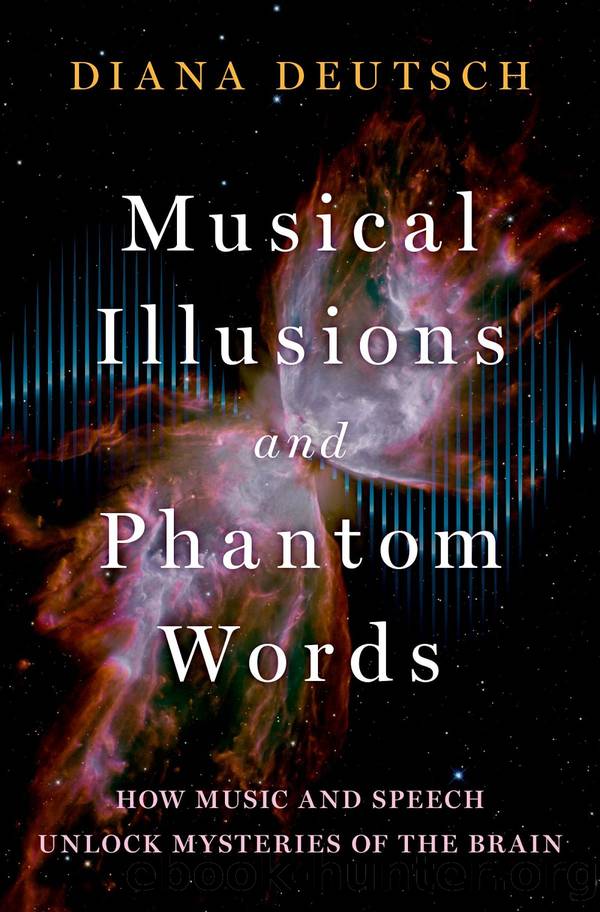Musical Illusions and Phantom Words by Diana Deutsch

Author:Diana Deutsch
Language: eng
Format: epub
Publisher: Oxford University Press
Published: 2019-06-15T00:00:00+00:00
In this story, Twain describes how he came across the jingle in a newspaper. It instantly took entire possession of him and âwent waltzing through [his] brain,â so that he was unable to tell whether or not he had eaten his breakfast, his dayâs work was ruined, and he was unable to read, write, or even sleep. All he could do was rave âPunch! Oh, punch! Punch in the presence of the passenjare!â Two days later, he became rid of the jingle by unwittingly passing it along to a friend, who in turn was rendered incapacitated, and could only repeat the remorseless rhymes. His friend was finally saved from an insane asylum by discharging the persecuting jingle into the ears of a group of university students.16
The tendency for music to get stuck in our heads makes it ideal for radio and TV advertisementsâa catchy tune can turn into an earworm, and carry the name of the product along with it. But words are also very important to the success of ad jingles, and the fact that they are sung rather than spoken is a key factor here. People will shrug off a spoken message that is ridiculous or obviously manipulative. But if the same message is sung, we allow it to get through to us. For example, the âOscar Mayer Wiener Songââone of the most successful commercials everâfeatures children singing:
Oh, I wish I were an Oscar Mayer Wiener
That is what Iâd truly like to be
But thatâs ridiculousâwho would ever want to be an Oscar Mayer Wiener? The absurdity of this statement grabs your attention so that you listen through to the end of the advertisement, and hear the words âOscar Mayer Wienerâ five times in 40 seconds! (Amazingly, the composer, Richard Trentlage, composed the jingle in an hour, after hearing his young son say, âI wish I could be a dirt bike hotdog.â He took another 20 minutes to record his two children singing it in his living roomâand the rest is history.)
A few years back, I asked Michael A. Levine, the composer of the enormously catchy and successful Kit Kat commercial âGimme a Breakâ about the features he believes are responsible for the success of his jingleâbeyond the obvious catchiness of the melody. (The jingle, which is often described as one of the catchiest of all time, is still going strongâand has been listed as one of the top ten earworms.) Levine described in a podcast of Burnt Toast17 how he composed the jingle in an elevator ride to confer with the sponsors.
In his email back to me, Levine wrote:
Malcolm Gladwell articulated something that I felt but hadnât expressed as succinctly by saying that âstickinessâ - an inherent property of earworms -is dependent on some level of âwrongness.â If something is just the right amount out of whack - almost but not enough to attract conscious attention - then your subconscious goes over and over it trying to figure it out. I once referred to this kind of low-level
Download
This site does not store any files on its server. We only index and link to content provided by other sites. Please contact the content providers to delete copyright contents if any and email us, we'll remove relevant links or contents immediately.
| Appreciation | Blank Sheet Music |
| Composition | Conducting |
| Exercises | Instruction & Study |
| Lyrics | MIDI, Mixers, etc |
| Philosophy & Social Aspects | Songwriting |
| Techniques | Theory |
| Vocal |
The Goal (Off-Campus #4) by Elle Kennedy(13674)
Kathy Andrews Collection by Kathy Andrews(11834)
Diary of a Player by Brad Paisley(7581)
Assassin’s Fate by Robin Hobb(6218)
What Does This Button Do? by Bruce Dickinson(6207)
Big Little Lies by Liane Moriarty(5804)
Altered Sensations by David Pantalony(5105)
Pale Blue Dot by Carl Sagan(5008)
Sticky Fingers by Joe Hagan(4199)
The Death of the Heart by Elizabeth Bowen(3622)
The Heroin Diaries by Nikki Sixx(3550)
Confessions of a Video Vixen by Karrine Steffans(3309)
Beneath These Shadows by Meghan March(3308)
How Music Works by David Byrne(3270)
The Help by Kathryn Stockett(3149)
Jam by Jam (epub)(3093)
Harry Potter 4 - Harry Potter and The Goblet of Fire by J.K.Rowling(3074)
Computational Linguistics and Intelligent Text Processing: 20th International Conference, CICLing 2019 La Rochelle, France, April 7â13, 2019 Revised Selected Papers, Part I by Alexander Gelbukh(2995)
Strange Fascination: David Bowie: The Definitive Story by David Buckley(2872)
